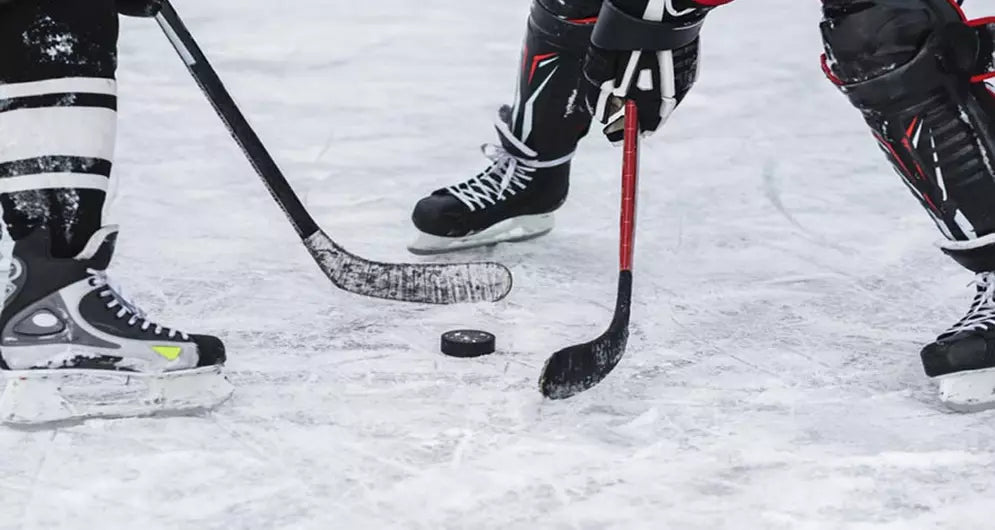It’s time to sharpen your skates and tape your stick. But perhaps you’ve not been so diligent in your off-season nutrition, and you’ve let your diet slip a bit. Or perhaps you are new to competitive play, and you’re not sure how to use nutrition to help support your pre-season training.
Either way, let’s keep it straightforward, and focus on a few basics that will help separate you from the benders.
Hydration
The amount of water and electrolytes you need depends on various factors. Some of those factors could be your body size, your personal sweat rate, your playing time and your position.
In general, stay proactive with your hydration during the day so you are not going into practice thirsty. If possible, weigh yourself before and after practice. A slight decrease in weight after practice is expected. If the difference is more than 2% body weight loss, you might need to slightly increase your fluids during practice, and be sure to replenish after training. Consider adding sports drinks that provide additional electrolytes, and find what works for you now during the pre-season. That way you don’t have to make large adjustments in hydration during the season. And be sure to adequately hydrate after practice to help support recovery. There are simply too many variables to give a one-size-fits-all recommendation. Search out a good hydration calculator online that adjusts for your body weight, training intensity and duration of training to help guide you. When in doubt, seek the advice of a registered dietician or medical professional for your specific needs.
Total Daily Calories
Your total calorie needs are going to vary depending on if you a seeking to gain, lose or maintain weight. Remember, changing your weight has less to do with the foods you choose and more to do with the amount of calories you consume in a day. To gain weight you need to be eating a calorie surplus – consuming more calories than you are expending. To maintain your weight you want to match your calorie intake each day to what you are burning. And to lose weight, you need to be in a calorie deficit – consuming fewer calories than you are expending. If you need to drop a bit of weight, forget the latest fad diet. Follow a balanced diet and adjust portion sizes to your individualized needs.
So what is a balanced diet for ice hockey players? Actually, quite similar to most athletes.
The Acceptable Macronutrient Distribution ranges are as follows: Protein should comprise 10% to 35% of your total daily calories. Carbohydrates should comprise 45% to 65% of your total daily calories. And fats should be 20% to 35% of you total daily calories, with saturated fats no more than 10% of fat calories.
Choose the foods you enjoy eating each day while trying to incorporate balanced, nutrient dense foods. From there, just use your scale. If you are trying to gain, and it’s not happening either increase your portion sizes or add 1 or 2 snacks. If you are trying to maintain and you are, keep going. And if you are trying to lose and you are not – check your portion sizes.
Keep in mind that generally, a skater can burn calories quickly, depending on duration and intensity. So, count your total hard skate time per practice or scrimmage and consider adjusting your caloric intake as needed to help support your goals – gaining, maintaining or losing weight.
Meals and Snacks
In general, you should try to consume somewhere between 3 and 4 meals and 1 to 3 snacks per day, based on your appetite and schedule. Meals are typically larger – 500+ calories. Snacks are smaller – typically 200 to 300 calories.
At each meal and snack, try to incorporate simple or complex carbohydrates as much as possible. Complex carbohydrates are like whole grains, while simple carbohydrates are fruits and fruit juices.
Post-Workout and Nighttime Nutrition
If you’ve just put in the work, you’ve been using and breaking down muscle and using a lot of fuel – glycogen. One of your main nutrition goals should be to help support recovery. Keep it simple. Try to make sure you are getting a well-balanced meal containing protein and carbohydrates after you finish practice. And don’t worry, if you are not hungry immediately post practice don’t force yourself to eat. Take your time, warm down, change your clothes, clean up and have your meal as your appetite increases in the hour or two post practice. And don’t neglect hydration at this point as sufficient fluids will help support overall recovery.
Last, keep in mind that your body largely recovers from both the stress of the day, as well as, the stress of pre-season practice when you sleep. So first, don’t neglect sleep and its benefits on recovery. Then consider consuming your last snack (a meal will probably be too much food for most) shortly before you turn in. This helps support muscle recovery when you sleep and helps refill your glycogen stores for the next practice.
So, as you move into the pre-season, focus on your nutrition fundamentals. You should be well prepared when the regular season arrives.





